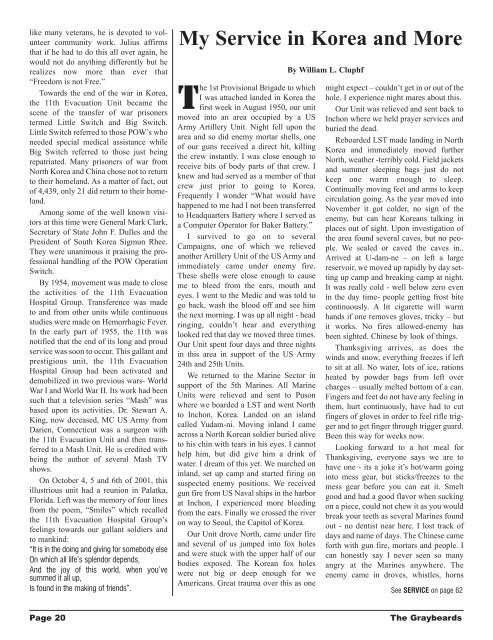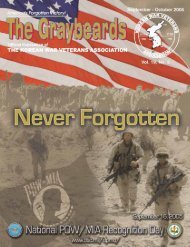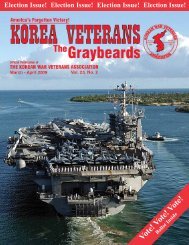The Graybeards - KWVA - Korean War Veterans Association
The Graybeards - KWVA - Korean War Veterans Association
The Graybeards - KWVA - Korean War Veterans Association
Create successful ePaper yourself
Turn your PDF publications into a flip-book with our unique Google optimized e-Paper software.
like many veterans, he is devoted to volunteer<br />
community work. Julius affirms<br />
that if he had to do this all over again, he<br />
would not do anything differently but he<br />
realizes now more than ever that<br />
“Freedom is not Free.”<br />
Towards the end of the war in Korea,<br />
the 11th Evacuation Unit became the<br />
scene of the transfer of war prisoners<br />
termed Little Switch and Big Switch.<br />
Little Switch referred to those POW’s who<br />
needed special medical assistance while<br />
Big Switch referred to those just being<br />
repatriated. Many prisoners of war from<br />
North Korea and China chose not to return<br />
to their homeland. As a matter of fact, out<br />
of 4,439, only 21 did return to their homeland.<br />
Among some of the well known visitors<br />
at this time were General Mark Clark,<br />
Secretary of State John F. Dulles and the<br />
President of South Korea Sigmun Rhee.<br />
<strong>The</strong>y were unanimous it praising the professional<br />
handling of the POW Operation<br />
Switch.<br />
By 1954, movement was made to close<br />
the activities of the 11th Evacuation<br />
Hospital Group. Transference was made<br />
to and from other units while continuous<br />
studies were made on Hemorrhagic Fever.<br />
In the early part of 1955, the 11th was<br />
notified that the end of its long and proud<br />
service was soon to occur. This gallant and<br />
prestigious unit, the 11th Evacuation<br />
Hospital Group had been activated and<br />
demobilized in two previous wars- World<br />
<strong>War</strong> I and World <strong>War</strong> II. Its work had been<br />
such that a television series “Mash” was<br />
based upon its activities. Dr. Stewart A.<br />
King, now deceased, MC US Army from<br />
Darien, Connecticut was a surgeon with<br />
the 11th Evacuation Unit and then transferred<br />
to a Mash Unit. He is credited with<br />
being the author of several Mash TV<br />
shows.<br />
On October 4, 5 and 6th of 2001, this<br />
illustrious unit had a reunion in Palatka,<br />
Florida. Left was the memory of four lines<br />
from the poem, “Smiles” which recalled<br />
the 11th Evacuation Hospital Group’s<br />
feelings towards our gallant soldiers and<br />
to mankind:<br />
“It is in the doing and giving for somebody else<br />
On which all life’s splendor depends,<br />
And the joy of this world, when you’ve<br />
summed it all up,<br />
Is found in the making of friends”.<br />
My Service in Korea and More<br />
<strong>The</strong> 1st Provisional Brigade to which<br />
I was attached landed in Korea the<br />
first week in August 1950, our unit<br />
moved into an area occupied by a US<br />
Army Artillery Unit. Night fell upon the<br />
area and so did enemy mortar shells, one<br />
of our guns received a direct hit, killing<br />
the crew instantly. I was close enough to<br />
receive bits of body parts of that crew. I<br />
knew and had served as a member of that<br />
crew just prior to going to Korea.<br />
Frequently I wonder “What would have<br />
happened to me had I not been transferred<br />
to Headquarters Battery where I served as<br />
a Computer Operator for Baker Battery.”<br />
I survived to go on to several<br />
Campaigns, one of which we relieved<br />
another Artillery Unit of the US Army and<br />
immediately came under enemy fire.<br />
<strong>The</strong>se shells were close enough to cause<br />
me to bleed from the ears, mouth and<br />
eyes. I went to the Medic and was told to<br />
go back, wash the blood off and see him<br />
the next morning. I was up all night - head<br />
ringing, couldn’t hear and everything<br />
looked red that day we moved three times.<br />
Our Unit spent four days and three nights<br />
in this area in support of the US Army<br />
24th and 25th Units.<br />
We returned to the Marine Sector in<br />
support of the 5th Marines. All Marine<br />
Units were relieved and sent to Puson<br />
where we boarded a LST and went North<br />
to Inchon, Korea. Landed on an island<br />
called Yudam-ni. Moving inland I came<br />
across a North <strong>Korean</strong> soldier buried alive<br />
to his chin with tears in his eyes. I cannot<br />
help him, but did give him a drink of<br />
water. I dream of this yet. We marched on<br />
inland, set up camp and started firing on<br />
suspected enemy positions. We received<br />
gun fire from US Naval ships in the harbor<br />
at Inchon, I experienced more bleeding<br />
from the ears. Finally we crossed the river<br />
on way to Seoul, the Capitol of Korea.<br />
Our Unit drove North, came under fire<br />
and several of us jumped into fox holes<br />
and were stuck with the upper half of our<br />
bodies exposed. <strong>The</strong> <strong>Korean</strong> fox holes<br />
were not big or deep enough for we<br />
Americans. Great trauma over this as one<br />
By William L. Cluphf<br />
might expect – couldn’t get in or out of the<br />
hole. I experience night mares about this.<br />
Our Unit was relieved and sent back to<br />
Inchon where we held prayer services and<br />
buried the dead.<br />
Reboarded LST made landing in North<br />
Korea and immediately moved further<br />
North, weather -terribly cold. Field jackets<br />
and summer sleeping bags just do not<br />
keep one warm enough to sleep.<br />
Continually moving feet and arms to keep<br />
circulation going. As the year moved into<br />
November it got colder, no sign of the<br />
enemy, but can hear <strong>Korean</strong>s talking in<br />
places out of sight. Upon investigation of<br />
the area found several caves, but no people.<br />
We sealed or caved the caves in..<br />
Arrived at U-dam-ne – on left a large<br />
reservoir, we moved up rapidly by day setting<br />
up camp and breaking camp at night.<br />
It was really cold - well below zero even<br />
in the day time- people getting frost bite<br />
continuously. A lit cigarette will warm<br />
hands if one removes gloves, tricky – but<br />
it works. No fires allowed-enemy has<br />
been sighted. Chinese by look of things.<br />
Thanksgiving arrives, as does the<br />
winds and snow, everything freezes if left<br />
to sit at all. No water, lots of ice, rations<br />
heated by powder bags from left over<br />
charges – usually melted bottom of a can.<br />
Fingers and feet do not have any feeling in<br />
them, hurt continuously, have had to cut<br />
fingers of gloves in order to feel rifle trigger<br />
and to get finger through trigger guard.<br />
Been this way for weeks now.<br />
Looking forward to a hot meal for<br />
Thanksgiving, everyone says we are to<br />
have one - its a joke it’s hot/warm going<br />
into mess gear, but sticks/freezes to the<br />
mess gear before you can eat it. Smelt<br />
good and had a good flavor when sucking<br />
on a piece, could not chew it as you would<br />
break your teeth as several Marines found<br />
out - no dentist near here. I lost track of<br />
days and name of days. <strong>The</strong> Chinese came<br />
forth with gun fire, mortars and people. I<br />
can honestly say I never seen so many<br />
angry at the Marines anywhere. <strong>The</strong><br />
enemy came in droves, whistles, horns<br />
See SERVICE on page 62<br />
Page 20<br />
<strong>The</strong> <strong>Graybeards</strong>

















